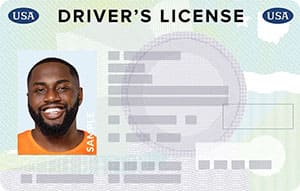- Updated for December 2024
- Based on official Virginia Driver's manual
Free DMV Written Test Simulator for Virginia | Updated for 2024
Waiting for somebody to go and get your driving license for you? That’s waiting in vain – nobody but you can do it. So start now – we’re here to help you. We don’t issue licenses – we assist you in getting ready to take your DMV Written Test with confidence. Here’s our 2nd VA permit practice test brought to you online – which means it’s available everywhere you’re connected to the Internet, whenever you want. And, BTW, as many times as you need – no one’s gonna disturb you with payment requests – simply because our test is free. No hidden fees – or direct ones for that matter. To be completely honest, there’s no registration, either. Interested? Sure, let’s look at this – all the 40 multiple-choice questions is based on the new official Virginia Driver’s Manual, the most reliable source telling you all you should know about road signs and traffic rules – very good read, check it out. The question format and scoring system are the same as in a real DMV exam – so practice with us and you’ll know what lies ahead. Ready? Below is the first question with four answer options – like all the rest you’re gonna come across on this test. Select and click the right one – that’s your task. It might not be as easy as it seems – in fact, it’s not meant to be easy. That’s why we included some hints to help you – use them well and remember that no one’s gonna help you on a real DMV test. Bear in mind the progress bar on the left-hand side of the screen – it’ll mark every correct answer with green, and you’ll get the next question automatically. If the color’s red, it means you could’ve done better – if you wonder how, read our explanation – you might have a similar task on a real test. Go on to the end of the test and you’ll get your final result. Remember that the number of tries is unlimited and the tasks will be randomized each new time you take out VA permit practice test – so bring it to perfection. When you’re satisfied with the result, share your feelings with friends – tweet them about our test or simply hit the “Like” button above. Good luck!
- Perfect for learner’s permit, driver’s license, and Senior Refresher Test
- Triple-checked for accuracy
What you need to know

What to expect on the actual VA DMV exam
questions
correct answers to pass
passing score
minimum age to apply
Helpful links
List of questions (classic view)
- Which of the following statements about freeways is FALSE?
- Headrests should be adjusted so that the head restraint contacts the back of the head. This prevents
- You are at a stop sign, waiting to turn right. A vehicle approaching from the left has its turn signal on. What should you do?
- What does this sign mean?
- If you are changing lanes, preparing to pass another vehicle, or entering traffic, signal and check for passing traffic. First, use your mirrors. Then
- What does this sign mean?
- The danger areas around trucks and buses where crashes are more likely to occur are called
- To help avoid a collision, you should
- When you see a pedestrian crossing an unmarked crosswalk where there is no traffic control signal, you should
- If a driver behind you repeatedly flashes his or her headlights, you should
- If fog closes in completely while you are driving and visibility is reduced to near zero, what should you do?
- When any vehicle turns, its rear wheels will follow a _________ than its front wheels.
- If you are about to pass a bicycle to your right and an oncoming vehicle is approaching you on your left, what should you do?
- In Virginia, if you approach a pedestrian with a white cane who is about to cross the road, you must
- On a two-lane road, you are allowed to pass
- If the road is too narrow to make a U-turn, you may make
- On a multilane roadway with several lanes in your direction, you must use _________ for passing.
- An __________ is the connection of a freeway to a road or another freeway by a series of ramps.
- On a roadway with three or more lanes going in the same direction, which lanes usually offer the smoothest flow of traffic?
- Whenever you're following a vehicle at night,
- To guard against glare from the headlights of a vehicle behind you, use __________ and adjust it before you drive.
- At railroad crossings that are only marked with a stop sign, you must stop and then proceed only when
- If you see a _________ sign in your lane, it means you are going the wrong way.
- When backing up your vehicle, you must
- What does this sign mean?
- When are you allowed to drive on the shoulder to pass another vehicle on the right?
- _________ are a pair of white or longitudinal lines that mark where pedestrians may walk.
- When you come to an intersection, follow the _________ before you proceed.
- You must NOT pass a vehicle on the left when
- If vehicles approaching from opposite directions each reach a stop sign at about the same time, then
- When there is a double solid yellow line next to your lane, you are
- Center lanes that are marked on each side by a solid yellow line and a broken yellow line are reserved for _________ and can be used by vehicles traveling in either direction.
- When you find both a solid and a broken yellow line between opposing lanes of traffic, you must NOT pass
- While getting onto an expressway, you reach the end of the on-ramp. At this point, you should be traveling
- On a divided highway, _________indicates the left edge of traffic lanes going in the same direction as you are.
- What does this sign indicate?
- If you are signaled by a flagger at or near a railroad crossing or work zone, you must
- If you miss your exit on a freeway, you should
- A flashing yellow light means that you should
- In Virginia, what does this sign indicate?
- Alabama: Test 1 / Test 2
- Alaska: Test 1 / Test 2
- Arizona: Test 1 / Test 2
- Arkansas: Test 1 / Test 2
- California: Test 1 / Test 2
- Colorado: Test 1 / Test 2
- Connecticut: Test 1 / Test 2
- Delaware: Test 1 / Test 2
- District of Columbia: Test 1 / Test 2
- Florida: Test 1 / Test 2
- Georgia: Test 1 / Test 2
- Hawaii: Test 1 / Test 2
- Idaho: Test 1 / Test 2
- Illinois: Test 1 / Test 2
- Indiana: Test 1 / Test 2
- Iowa: Test 1 / Test 2
- Kansas: Test 1 / Test 2
- Kentucky: Test 1 / Test 2
- Louisiana: Test 1 / Test 2
- Maine: Test 1 / Test 2
- Maryland: Test 1 / Test 2
- Massachusetts: Test 1 / Test 2
- Michigan: Test 1 / Test 2
- Minnesota: Test 1 / Test 2
- Mississippi: Test 1 / Test 2
- Missouri: Test 1 / Test 2
- Montana: Test 1 / Test 2
- Nebraska: Test 1 / Test 2
- Nevada: Test 1 / Test 2
- New Hampshire: Test 1 / Test 2
- New Jersey: Test 1 / Test 2
- New Mexico: Test 1 / Test 2
- New York: Test 1 / Test 2
- North Carolina: Test 1 / Test 2
- North Dakota: Test 1 / Test 2
- Ohio: Test 1 / Test 2
- Oklahoma: Test 1 / Test 2
- Oregon: Test 1 / Test 2
- Pennsylvania: Test 1 / Test 2
- Rhode Island: Test 1 / Test 2
- South Carolina: Test 1 / Test 2
- South Dakota: Test 1 / Test 2
- Tennessee: Test 1 / Test 2
- Texas: Test 1 / Test 2
- Utah: Test 1 / Test 2
- Vermont: Test 1 / Test 2
- Virginia: Test 1 / Test 2
- Washington: Test 1 / Test 2
- West Virginia: Test 1 / Test 2
- Wisconsin: Test 1 / Test 2
- Wyoming: Test 1 / Test 2
Your go-to, trusted source
Experience the Driving-Tests differenceOur commitment to accuracy and quality in our practice tests
Explore our rigorous, multi-tiered verification process that ensures each question mirrors the official manual for unparalleled accuracy.

At Driving-Tests.org, we understand the importance of reliable and accurate practice tests to help you prepare for your DMV exam. That's why we've developed a meticulous process to create and continually update our practice questions, ensuring they reflect the most current driving laws and regulations.
Here's an inside look at how we maintain the highest quality in our practice tests.
Content Creation and Verification Process
- Alignment with Official Manuals:
Every question we develop is based on the most recent version of each state's official driving manual. Our team regularly monitors each state DMV's website for the latest updates to ensure our practice tests are always aligned with the most current information. - Community Feedback Integration:
We leverage feedback from our vast community of users to understand which topics are most frequently tested. This helps us focus on the areas that are most relevant and beneficial for your preparation. - Expert Content Creation:
Our in-house editor, Steven, who has extensive experience in driver education, crafts each question with precision. He conducts a thorough review of each question against the official manuals to ensure accuracy. - Rigorous Review Process:
Once Steven has finalized a set of questions, our team conducts a joint review session. This second level of scrutiny involves content accuracy, proofreading, and fact-checking to eliminate any errors. - User Feedback Mechanism:
After a question goes live on our site, we keep the lines of communication open. Each question features a feedback button, inviting users to report any issues or errors. This continuous feedback loop allows us to address and rectify any concerns promptly. - Responsive Updates:
In line with our commitment to accuracy, we quickly update our practice questions to reflect any changes in the DMV manuals. Additionally, we update the free electronic copy of the state's driver's license manuals on our site, typically within a few days after the DMV publishes them.
Our thorough quality control process ensures that you have access to practice tests that are as accurate and up-to-date as possible. We believe in the power of well-prepared drivers and are dedicated to providing you with the best study tools to help you succeed on your DMV exam.
